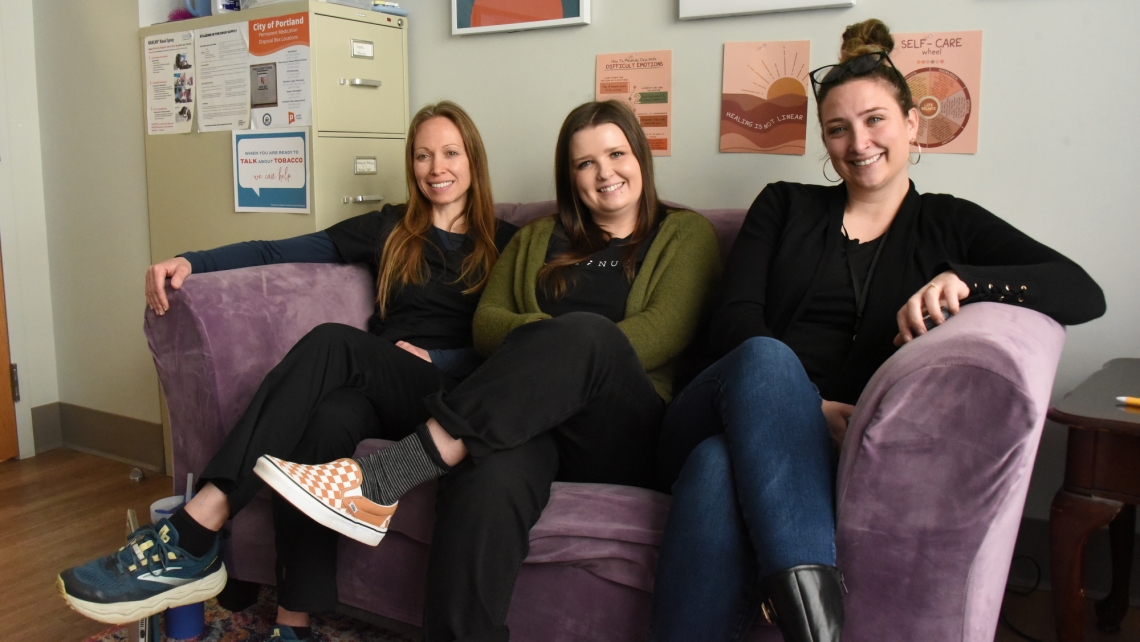Opioid Health Home seeks to rebuild lives

For the past four years, Catholic Charities Maine’s Opioid Health Home (OHH), based in Portland, has been helping men and women break free from the stranglehold of opioid use.
“It’s super important because people are dying from this disease,” says Francesca Gallant, LMSW-CC, CADC, MHRTC, a clinical counselor. “It’s a huge problem.”
And soon, the program will expand to serve teenagers as well as adults.
“It’s important because a lot of people start using in their teens,” says Francesca. “That’s really concerning because some kids are experimenting with opioids, and that’s super dangerous.”
“I was a school nurse at a high school before this, and there’s definitely a need for this — and not just opioids but substances in general,” says Annie Chang, RN, BSN, BA, a nurse care manager.
Despite its name, an Opioid Health Home is not a residential treatment facility. Rather, it is a program that offers comprehensive and interconnected services for those who have a primary diagnosis of opioid use disorder. Those services include medication-assisted treatment, such as prescriptions for Sublocade® or Suboxone, counseling, peer support, monitoring by a registered nurse, connection with a prescriber — often through telehealth — and group meetings that, in Catholic Charities’ case, can include art and poetry.
“It’s connection first. I think how we really focus as a team is connection first with our clients and getting to know them,” says Daley Lentz, LCSW, LADC, CCS, Behavioral Health Network (BHN) clinical team lead.
“There’s no judgment, and there is a lot of compassion. I think that draws people here,” says Annie.
Members of Catholic Charities’ OHH team say they strive to meet their clients wherever they’re at. For some individuals, that could mean a same-day response at office locations, while for others, it could mean connecting with them in the community, at a shelter, or in their home. Some people may have been in recovery for years while others are still actively using.
“We function out of a harm-reduction base, which is basically reducing as much harm as possible while helping somebody get to the point where they’re ready for recovery or sobriety,” says Daley.
After an initial assessment, there are three stages to the program, beginning with an introduction to medication-assisted treatment for those who have not previously used it.
There is then a stabilization period during which people come in to see their treatment providers at least every other week, including counselors like Francesca.
“One of the things that I do a lot is talk about the science behind substance use because a lot of people don’t understand why their brain is the way it is. Not having that understanding can be really confusing, so we provide that information, look at their goals, both long-term goals and short-term goals, and also make sure they’re safe, for instance, creating a relapse prevention program, which identifies triggers for use and healthy ways to cope,” says Francesca.
Narcan and training on how to use it are also available.
Clients then advance to a maintenance stage, during which they come in monthly to see their prescriber, meet with a counselor or attend a workshop, and check in with a nurse care coordinator or a recovery coach.
There is also an option for folks who want to begin medication-assisted treatment but aren’t yet ready for counseling or for folks in long-term recovery, who may no longer feel they need counseling.
Because opioid use affects the whole family, not just the individual, Catholic Charities says when possible, it tries to include family members. For teenagers, parents or guardians will be involved.
“Including family members in the treatment creates a strong foundation for the family to support one another and heal over time. Sometimes, a parent or caregiver may really be at a loss about how to support their loved one or child. It is painful to watch a loved one suffer from addiction, and parents and caregivers often experience a sense of helplessness. We are here to help,” says Kelly Butler, LCPC, LADC, CCS, who is BHN regional director.
OHH team members plan to visit schools and teen centers in the greater Portland area, meet with guidance counselors and social workers, and use their connections with physicians’ offices to spread the word about the new teen program.
“We want people to know that we’re here to help. I think asking for help, especially for a teenager, is so scary,” says Daley.
Annie, Daley, Francesca, and Kelly say they know how dangerous opioids are and how challenging recovery can be, which is why they’re so committed to their work.
“I did not want to work in a for-profit health-care setting, and I’ve always enjoyed working with underserved populations, so this fit the bill for me,” says Annie, who also likes having regular hours.
“I got into it because I’ve had family in recovery, and I also think that it’s a need,” says Francesca. “I try to be very empathetic, understanding, and patient because I know that is something that people need who are struggling with substance use.”
“I really enjoy my job because I love connecting to our clients,” says Daley. “I think everybody has a story and an experience, and I love to learn about that and see them as a person and not just as a stigma or whatever label they have for themselves or that people have for them.”










